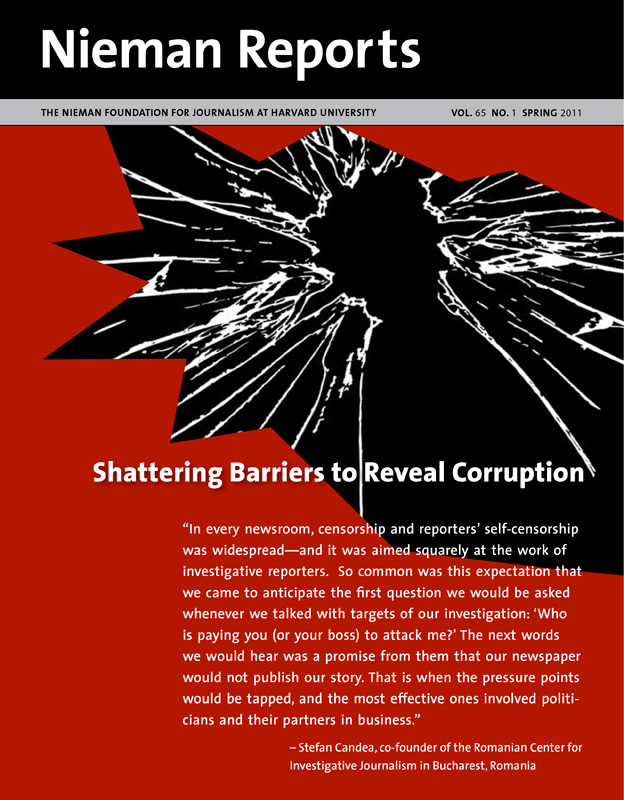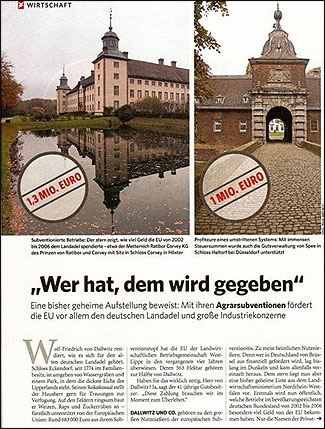
Shattering Barriers to Reveal Corruption
Barriers to reporting on corruption are numerous. Pushing past them can be risky, especially in countries where powerful interests are entrenched in business, media organizations, and government. Arrest. Legal action. Forced exile. Threats. Murder. Journalists face such dangers where the fear of what reporters might discover creates a climate of censorship and caution in newsrooms. Journalists describe the toll taken to tell stories about the corruption in their own backyards. Those who support their efforts speak to emerging strategies of training and assistance.

Under this banner, the European Fund for Investigative Journalism featured reporting that it financed in Ireland and Latvia on human trafficking.
They are poor women who come mostly from Latvia, a country on the easternmost border of the European Union. What they hope to find in Ireland is a better life for themselves and their families. Instead, they experience abuse and threats, and soon they are powerless and trapped. The assaults against them are committed by members of organized crime groups who lured the women—with the promise of $1,300 to $2,600—into sham marriages to obtain E.U. residence permits for men, many of whom are from the Indian subcontinent. The rules and loopholes that enable the women to be brought here were decided in Dublin, the capital of Ireland, and Brussels, the headquarters of the E.U.
Aleksandra Jolkina, a young and committed Latvian journalist, had been researching this topic in Latvia since 2007 when she worked for the daily newspaper Diena ("The Day"). Likewise, Jamie Smyth, a social affairs reporter who is the former European correspondent for the Dublin-based Irish Times, had been working on the same story. Last summer, with assistance from the European Fund for Investigative Journalism, Smyth and Jolkina joined forces to stitch together the beguiling chain of supply and demand. "Working together enabled both of us to identify contacts in each other's countries that would have been difficult or impossible to source while working on our own," Smyth has observed.
In October after Smyth traveled to Latvia for Jolkina's assistance with reporting, The Irish Times published a series of three stories about sham marriages. In turn, Jolkina went to Ireland to report on the story from angles she hadn't been able to cover from Latvia. By working together to connect the two ends of the Latvian women's journey, Jolkina and Smyth produced stories that made big headlines in Ireland and were noticed throughout Europe. Early this year, Jolkina's book on the subject was published in Latvia.

The Need to Cooperate
RELATED LINK
Resources for Investigative ReportersThe chain of human trafficking involved two countries on opposite sides of the E.U.; yet the enabling legislation, decided at the E.U. level, affected all E.U. countries. This circumstance is quite typical today when it comes to stories about social affairs and public policy in Europe. As such, networking among journalists is essential to fulfilling their role as watchdogs. Yet, especially when travel, multiple languages, and various administrative entities are involved, working as a team can mean additional costs. Jolkina and Smyth managed to cover travel and other costs through the grant they received from the European Fund for Investigative Journalism.
This is a project I've been building up since 2008 with assistance from the Belgian journalism foundation, the Pascal Decroos Fund. It has provided research grants to journalists in Belgium for more than a decade.
I learned of the Decroos fund when I worked in Brussels as a European affairs correspondent for a Danish newspaper. In Brussels, many of the journalists who comprise the world's second largest corps of correspondents (the largest is in Washington, D.C.) spent much of their time focused on agendas related to their native countries, even though the E.U. has developed into a quasi-federal body. I came to believe that if reporters want to play an effective watchdog role in overseeing what happens in Brussels then we need to produce better journalism. And to do this requires finding ways to cooperate with journalists from other countries on reporting important cross-border stories.
The fact that E.U. countries have 23 official languages and several non-official languages can appear to present obstacles. Yet the many languages and media cultures enable journalists to draw on their research competencies, joining together in cooperative, not competitive, ways. Knowledge about common issues can be compared and contrasted as a way to move forward with a vexing topic. No new networks of sources have to be created; reporters can share resources to mutual benefit. Through such partnerships journalists can obtain high-level research that they can shape into stories told in their native languages and fit into their media tradition.
By investigating and illuminating issues common to E.U. countries, these journalists do their part in creating a vital and vibrant European public sphere, which is something politicians, philosophers, political analysts, and media commentators have said for decades is lacking. Through networking, journalists contribute their part in shaping this European public sphere by investigating and illuminating its common issues.
When journalists have cooperated on stories, the impact of their work has been strong. One of the more significant projects that I have been involved with was Farmsubsidy.org. Each year the E.U. distributes more than $70 billion to subsidize farmers. Inspired by the success in 2004 of two Danish colleagues who made freedom of information requests about subsidies in Denmark, I asked that the European Commission provide me with information about all of those who benefited from the E.U.'s farm subsidy program. Only with that material in hand could we make a thorough analysis. My request was denied.

The German magazine Stern (“Star”) reported on how wealthy Europeans received farm subsidies, and it used a headline that translates as “He who has, will be given.”
RELATED ARTICLE
“Investigating Farm Subsidies on a Global Stage”
- Nils MulvadA year later I co-founded Farmsubsidy.org with the following plan in mind: We would work on this country by country. European journalists in as many countries as possible would file applications through their country's freedom of information system to request this information. Once they had the information and published stories in their native press, they would upload their data onto the common website. This way we would be able to see a wider European pattern evolve. This revealed that the usual political narrative that had these funds assisting small and poor farmers was wrong. Instead, we'd found that old European nobility and international corporations were among the program's largest beneficiaries. Interestingly, these stories strongly influenced public opinion; people started to talk in everyday conversations about farmers and their subsidies.
Given how well this networking approach worked, I decided to try using it to examine other cross-border issues. Since then I have been involved in several such investigations. There was the story about trafficked women; in others we were able to reveal side effects of pharmaceuticals and examine the ways in which lobbyists influence climate change policy. Another collaborative effort focused on illegal fisheries. Each story had European aspects to it, and in all cases stories were published in several countries to strengthen the impact. For several of these projects we received support from nonprofits to cover the additional costs for travel and translations.
Support Structures For Journalists
RELATED ARTICLE
“An Idea Born Out of Necessity—And It Works!”
- Henrik KaufholzFundraising story by story is cumbersome, as anyone who has done it will attest. To keep these efforts going, we needed a support structure. From my involvement in 2003 with the creation of Scoop—initiated by the Danish Association for Investigative Journalism and the Danish nonprofit International Media Support to offer support for journalists in the Balkans and Eastern Europe—I learned the value-added efficiency of creating a pool of resources and expertise to assist individual journalists or small teams of reporters in investigations. Comparably low levels of support were found to result in strong investigative pieces ranging from local corruption to regional war crimes to international trafficking.
With the Pascal Decroos Fund's visionary director, Ides Debruyne, I co-founded Journalismfund.eu in 2008 with the aim of expanding the reach and breadth of grants available to European teams of investigative journalists. While fundraising continues to be a challenge, we persist because we know this model works and provides value in the stories that emerge. In Europe, there exists a longstanding tradition of public monies being used to support media, along with safeguards for editorial independence; many European foundations and donors have slowly begun to carve out a role for themselves in this realm.
The needs we identify are specific. We do not want to support media institutions; we want to directly support journalists in their pursuit of investigative stories. Because of the difficult times in the media business, internal funding for investigative projects can be tough to get. Thus, important stories go untold. And as political and policy issues cut across borders—and reporters want to follow the money or compare and contrast circumstances—money isn't easily available to enable them to do this. We believe the changing European structures, combined with new media possibilities, provide good opportunities for quality journalism. Our goal is thus to channel money in support of research and networked reporting on specific stories.
Scoop and the Pascal Decroos Fund receive most of their funding from governments that respect their editorial independence. Recently we've had to halt our attempt to obtain E.U. grants because of a struggle about retaining journalistic independence. Our primary task is to develop support structures in Europe to facilitate cross-border, networked journalism. So part of our effort is to raise awareness among potential donors—and journalists—about the necessity of this model.
Brigitte Alfter is a freelance journalist covering European affairs and a co-founder of Scoop, Farmsubsidy.org, the Wobbing network, and the European Fund for Investigative Journalism. She was a co-winner of the Investigative Reporters and Editors' Freedom of Information Award in 2006 when she was a European affairs correspondent for the Danish newspaper Information. Her website is www.alfter.dk.


